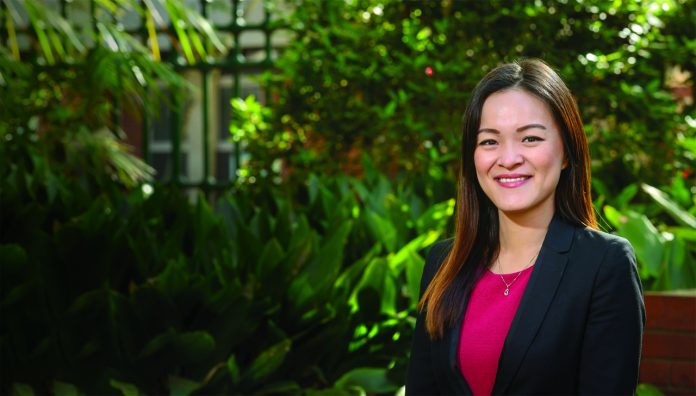Dr Renly Lim is a Research Fellow at the University of South Australia working to expand the role of pharmacists in residential care facilities, developing and evaluating a service to prevent medication-related side effects using digital health tools.
How did your National Health and Medical Research Council project come into being?
I’ve not worked in residential care facilities (RCFs) but I volunteer just as someone who is keen on helping older people. When the residents found out I was a pharmacist I started hearing stories from them saying, ‘I’m convinced that ever since the doctor gave me this medicine I’m losing my balance.’
It seemed that if they said this to the nurses they’d be told, ‘Oh no, you’re fine. You just sit down there and we’ll talk to the doctor.’ But that seemed to never happen and the resident wouldn’t get the opportunity to see their pharmacist.
I thought, ‘What if they do have a fall?’ I’d feel responsible for not doing anything. So that made me feel that there is so much more that we can do for people in RCFs.
The project came into conception when I started working with Professor Libby Roughead at the Quality Use of Medicines and Pharmacy Research Centre. Together with other co-investigators, we prepared a grant for the Pharmacy Trial Program.
So how does your NHMRC project help address that?
The overarching theme is digital health and medication safety. The most exciting objective is to develop and evaluate a novel pharmacy service in a randomised controlled trial in order to identify and prevent medication-related side effects in older people.
We’ve already started the participatory action research phase – we’ll be asking pharmacists to use a range of tools and we’ve started teaching them how to use them. We’re going to ask to fit an activity tracker on the residents, measure changes in weight and grip strength and other indicators of medication-induced side effects.
The pharmacists will then review the residential aged-care assessment records, interview patients, make recommendations to the residents’ GPs, and follow up on residents’ conditions during the next sessional pharmacist visit.
How could your work help change the role of pharmacists?
Currently the role of pharmacists in RCFs is quite limited – most of their work is Residential Medication Management Reviews. In this clinical trial we are testing a pharmacy session every eight weeks over a year.
The trial is funded by the federal Department of Health’s Pharmacy Trial, and the service will be evaluated by the Medical Services Advisory Committee to determine if it is effective and cost-effective.
If it’s successful, we hope that the program will be implemented nationally. That would greatly expand the nature of services that pharmacists can provide in RCFs.
During all this, you were involved in a University of Oxford project called Village Drama Against Malaria (VDAM). Tell us about your work in Cambodia?
The project was a science-art innovation involving a series of two-and-a-half day workshops, followed by a drama performance in each village.
The three key messages of the drama project were the need to use insecticide-treated bed nets and repellents, the importance of early diagnosis and treatment, and the risks of malaria. We saw very positive response in the villages.
I led the evaluation to assess the feasibility of using drama as a community engagement strategy for malaria elimination. We found that drama was effective in promoting awareness and understanding of malaria elimination.
Getting involved in this project was one of the most rewarding experiences in my career thus far. I got to know many international researchers, some of whom have become my research collaborators. Most importantly, Associate Professor Phaik Yeong Cheah from University of Oxford, and the head of the VDAM project, is now my mentor for my NHMRC fellowship.
What was the highlight of that experience for you?
It was a huge culture shock. When they asked if I’d like to be involved I said yes without knowing what I signed up for. The project was in a really remote area of Cambodia, where people have really limited access to education and health services. There’s a general lack of infrastructure, the roads are in terrible condition and they don’t have access to clean water.
Now, I know that Denmark and Norway got voted as the happiest countries in the world, but I feel like the Cambodian people are genuinely the happiest people in the world. They have so little, yet they’re really happy about living. So now every time I’m stressed about research I remember my time in Cambodia – when I taught them about malaria and they taught me about life.



 John Jones MPS, pharmacist immuniser and owner of My Community Pharmacy Shortland in Newcastle, NSW[/caption]
John Jones MPS, pharmacist immuniser and owner of My Community Pharmacy Shortland in Newcastle, NSW[/caption]


 Debbie Rigby FPS explaining how to correctly use different inhaler devices[/caption]
Debbie Rigby FPS explaining how to correctly use different inhaler devices[/caption]




 Professor Sepehr Shakib[/caption]
Professor Sepehr Shakib[/caption]

 Lee McLennan MPS[/caption]
Lee McLennan MPS[/caption]
 Dr Natalie Soulsby FPS, Adv Prac Pharm[/caption]
Dr Natalie Soulsby FPS, Adv Prac Pharm[/caption]
 Joanne Gross MPS[/caption]
Joanne Gross MPS[/caption]








